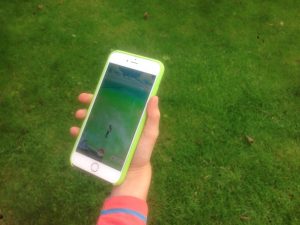
Tablets can provide a learning experience for children as well as entertainment. It’s amazing to see how even young toddlers can learn to play games on tablets with touch screens.
Toddlers love to play on smartphones and tablets. With relatively little dexterity they can swipe and press and interact with the games long before they can speak fluently. The gadgets are very intuitive, and toddlers get constantly rewarded with very little frustration or the need for help from an adult.
However, before we embrace all the new technology with open arms, it’s worth considering the impact that all this technology might have on our toddler’s social development and relationships.
Toddlers do not ‘need’ tablets or smartphones. Human beings have evolved and developed for thousands and thousands of years without them. The question many parents ask is, does the positive outweigh the negative or vice versa?
Professor Lydia Plowman is an education and development researcher at the University of Edinburgh who has looked at the pros and cons of a wide range of technological devices for children. She has even been invited by the Montessori movement to present her data on the effects of screen time for toddlers to help us understand the impact of technology on child development. She has been set to answer a question high on the list for parents – ‘What is the impact of electronic devices and tablets on my child?’
As parents, we tend to have an almost innate feeling that fresh air and learning through engagement with the physical environment is the natural and best way that children develop. So seeing your toddler staring at a small blue screen and tapping away to feed an imaginary pet can seem pointless and even harmful. This is especially worrying when we see an epidemic of obesity in even very young children and some children displaying poor core strength from lack of playing and climbing. Some doctors recommend as much as three hours of physical activity a day for small children and technology interferes with this.
Worries about potential overuse of technology by toddlers are exacerbated by the guilt most busy parents feel when they allow their toddlers to use or play on tablets and smartphones to keep them quiet. Most parents of toddlers have handed over their smartphone while waiting in a busy waiting room to see the doctor or so they can get chores done around the house.
In my experience, the best way to use tablets is by engaging with your child as they use them. Professor Plowman’s research findings echo this and she recommends that parents are present both physically and emotionally when their toddler is using technology.

When toddlers are playing on apps, parents and experts have voiced concerns that this stunts their social and emotional development. I am aware that this makes me sound like a fuddy-duddy, but I’ve been shocked and depressed to see very young teenage couples on dinner dates where both of them have been totally absorbed with their smartphone during the meal. This is a sad and potentially frightening insight into the future as these teenagers didn’t have smartphones available when they were toddlers and started using them in late childhood. If these late adopters are so addicted and shut off from the moment, what can we expect for our toddlers, who were using their fine motor skills as soon as they developed them, to swipe and click and play? Are there any benefits to a toddler’s social development to be gained by using apps on smart devices?
Professor Plowman’s research leads her to be more optimistic because of the way these devices are becoming more intuitive for children to use, which opens up lots of communication potential in toddlers who cannot speak yet and have been frustrated by being unable to communicate or be understood thus far.
I have a positive and a negative response to this conclusion.
First, the positive one from personal observation. My nephew suffered from moderate hearing loss as a baby and toddler and has been diagnosed with autism since the age of four. He has certainly made big cognitive leaps with the help of some of the fantastic developmental and learning apps available for tablets and smartphones.
When he was completely non-verbal, he was able to follow the pictographic instructions on many of these apps and was very engaged while learning words, numbers and logical concepts.
I even saw a TED talk by an Indian researcher who had effectively developed an app that allowed non-verbal autistic children to communicate quite complicated language via his pictographic app.
Second, the negative thought. Baby walkers were once hailed as a great way to help babies to learn to walk and help them get around and not feel frustrated. However, many developmental psychologists have argued that a child’s brain development is most optimally encouraged by the natural trial and error that is part and parcel of learning to walk. If you effectively allow a non-walking baby to walk before their ‘time’ you will not be enhancing their development and their brain development will be out of sync with their overall physical development.
If we take this general point about synchrony and apply it to the previous example of a non-verbal toddler using a device to communicate, one cannot immediately conclude that this is better than the historical synchrony of emotional development, language acquisition and the hugely complicated physical development that allows toddlers to articulate their first sounds, words, and sentences. That said, I still feel that my nephew had a disability and the tablet facilitated and helped him to overcome his language difficulties in a way that only intense private speech therapy would have achieved. Again this is what Professor Plowman also concludes when she says, ‘Many young children don’t yet communicate by reading and writing but are full of ideas that they want to express. This can be a frustrating stage for them, but using technology in the right way can empower them to get their ideas across. This can be especially true for children with communication difficulties.’
The most important way you can help your toddler to learn with devices is to share the game like you would share a book. Although most apps are non-verbal and intuitive to use, you have an important role in describing and explaining what your toddler is doing and why.
When helping your toddler, think about all those things you do naturally with a storybook.
There are lots of great apps that are both elegant and compelling and teach children about:
After you have played these games, you can remind your toddler of the skills, e.g., when asking your toddler to help you sort out the washing into piles of socks, knickers and t-shirts, she will be using the same skills as she used in the sorting game, turning virtual fun into real-world skills.

Toddlers love to get involved with online shopping. They can scroll through the list of favourite foods and go and check if you’ve run out of cornflakes and need another packet. It’s a bit like a treasure hunt, where they forage around the house, matching the image of the product on the computer to the actual product, and they also get to use some maths skills – for example, ‘Daddy eats tangerines all the time but we only have three left. Do you think we will need more for the next seven days?’
Children also enjoy checking the weather using a forecast weather app to see what the weather will be like in their town and in the towns that family and friends live in.
I’m not a futurologist, but it seems that at some point children will benefit from being able to use the modern technology that they will encounter at school and in life. Unless you are opting for a complete avoidance of electrical devices, you will need to decide when your children will be able to learn and master the devices in a safe and encouraging environment.
Don’t assume that an educational app will be better than a game app or indeed better than a more old-fashioned sticker workbook (which has the added bonus of developing fine motor control skills as a child unpeels a sticker and adds it to the right box). That said, there are a few fantastic word and number apps around.
There are some really appalling apps (usually free) that are:
To avoid these bad apps you should first:
Until more studies are done, it’s very hard to know what the optimal number of minutes and hours of screen time might be. Professor Plowman states that there is no current hard evidence that access to devices causes harm. However, when thinking about how long your child can play for, there are many factors to consider, including your toddler’s temperament and your family situation. Have the confidence to be firm about how much time is appropriate and be consistent. Don’t cave in if she pesters, as the amount of time she plays for or watches will just creep up and up.
If you focus on using the device with your toddler, you’ll be less likely to let your toddler overuse it. Tempting as it may be, try not to use them as ‘babysitting’ tools as toddlers can end up spending too much time on them.
Your toddler should have absolutely no time on devices or television in the two hours before she goes to bed. This is because the blue light emitted from tablets, laptops and smartphones is particularly disruptive to your toddler’s circadian rhythms and sleep patterns.
In addition, I feel that toddlers, whatever the weather, need to have some time outdoors everyday (epic blizzards and ice storms excepting!), so try to make sure that your toddler has a good balance strongly in favour of outside play and sharing books with a few short sessions playing with one app at a time during the day.
If you are concerned, you can use search engines like Google Scholar to keep up to date with the research on the effects of technology on toddler development. We will also update parents via Essential Parent on this page.
Playing with a (currently) two-dimensional screen is not reality. It is, therefore, no replacement for real life and real experience.
Playing on smartphones and tablets, therefore, needs to be a small part of a big life where toddlers should be playing and socialising in the real world. That means lots of opportunities to:
While playing on a tablet is not passive, like watching television, some of the guidelines I would suggest are the same. So, I would recommend no technology:
Emotional and language development is critical to toddlers, and this is one area where this technology falls down. Toddlers need to share lots of time with their family; talking, sharing books, playing, developing. Technology does tend to encroach on this vital part of a toddler’s life.
We should strive to make technology an asset to our family life and our toddler’s development. This is much easier said than done but if we use our common sense we should be able to let technology be a positive force and not something that is snuffing out our connections with nature, the physical world, and other people.
Chatting, dancing, sharing books and domestic chores are all fun and brilliantly interactive. Your child can help sort clean clothes into a pile for each family member or playing pairs with the socks (toddlers particularly love it if you match things wrong so they can say ‘No!’ and correct the mistake).
The technology we are allowing our toddlers to use is in its infancy, and it’s hard to know the impact it will have long-term. We we can reasonably expect is that technology will evolve over the coming years, and that it will continue to be present in our lives in one form or another. Parents need to protect their children from harm and even if they are technophobes they need to be informed and able to help their children interact with technology in a positive and life-enhancing way.
American Academy of Pediatrics (2011) ‘Policy Statement – Media Use by Children Younger Than 2 Years’ PEDIATRICS Vol. 128 No. 5 November 1, 2011 pp. 1040 -1045 (doi: 10.1542/peds.2011-1753)
Plowman L (2015) Researching young children’s everyday uses of technology in the family home. Interacting with Computers, 27 (1) 36-46.
Sigman (2005) ‘Remotely Controlled: How television is damaging our lives.’ Vermilion